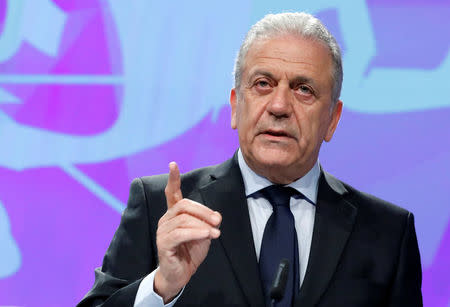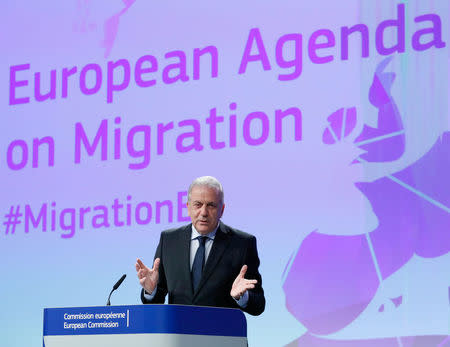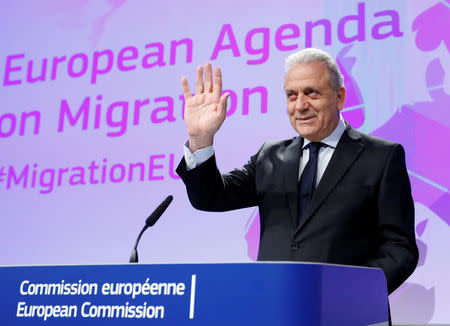Brussels tells EU states to detain more freely migrants awaiting deportation
By Gabriela Baczynska BRUSSELS (Reuters) - European Union member states should be ready to detain more migrants who have no case for asylum to prevent them from running away before they are deported, the chief migration official with the bloc's executive arm in Brussels said. The European Union is pushing to reduce immigration after some 1.6 million refugees and migrants reached its shores via the Mediterranean in 2014-2016. It wants to prevent people from coming and deport more. "Return rates have to be improved," Migration Commissioner Dimitris Avramopoulos said on Thursday in presenting new, non-binding, proposals by the executive European Commission. "Member states should also use the possibility to place migrants in detention if there is a risk of absconding and for a sufficient period to be able to complete the return and readmission procedure." Amnesty International criticized the proposals. "Detention of irregular migrants, some of the most vulnerable people in Europe, should be a last resort," said Iverna McGowan, head of the Amnesty International's EU office. Brussels estimates there may be around 1 million people in the EU who should be sent back but that only about a third of those with pending return are actually being returned. While EU law sets out the minimum common standards for returns, some member states had stricter domestic rules that could be eased to streamline the process, the Commission said. It recommended shorter appeals deadlines, issuing return decision with no expiry date, among others. It said EU states should be less coy about detaining people for the maximum allowed pre-deportation time-limit of 18 months if needed. "DIGNIFIED CONDITIONS" "It should never be considered something like a concentration camp," Avramopoulos said, fending off criticism by rights groups that such detentions were inadvisable. "The ones who are not entitled to refugee status, they have to be returned. But in meantime they have to stay somewhere - in very dignified conditions - in order to avoid absconding." Brussels said detention should not be ruled out for minors, just as returns for unaccompanied minors, both of which currently are red lines in some EU states. "That children are included in this wide detention regime is truly shocking," Amnesty's McGowan said. Beyond deportation, the Commission also proposed setting up by mid-year a program for assisted voluntary returns from Europe. It is already stepping up funding for the U.N. migration agency IOM to increase returns from Libya, now the main embarkation point for Europe. But there is no sign the bloc is getting anywhere near to breaking a stalemate on handling those who are already in. The Commission said only 13,546 people had been moved from Greece and Italy - the two biggest arrival countries in the EU - to other member states under a two-year plan that was supposed to cover 160,000 people and expires in September. It is a major point of contention among the frontline Greece and Italy, Germany and Sweden - the eventual hosts for most refugees - and Poland and Hungary, which refuse to take in any. Brussels has long threatened sanctions but EU states have not decided to act yet. The showdown could come around mid-year, with Berlin and Brussels among those pushing for a deal by then. "At some point we will have to get brutally clear with the Poles and the Hungarians that there will be punishment," said a senior EU diplomat. (Editing by Alison Williams)



